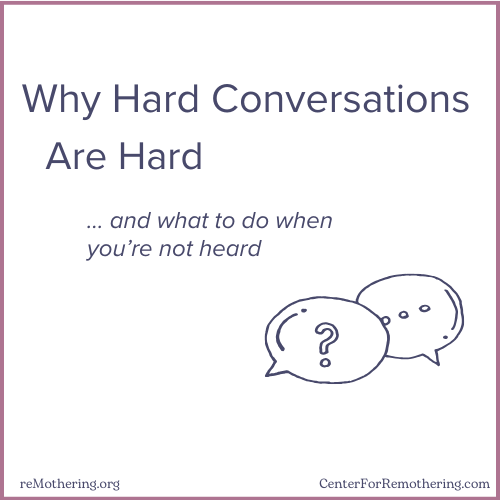Why Hard Conversations Are Hard—and What to Do When You’re Not Heard
For adult daughters of emotionally immature parents, the difficulty often runs deeper than the topic at hand.

Hard conversations are hard. Not just because of what we’re trying to say, but because of everything those moments stir up inside us.
For many adult daughters of emotionally immature parents, the challenge isn’t simply about choosing the right words. It’s about navigating long-standing adaptations—the ways we learned to manage emotionally complicated or inconsistent relational terrain.
Unlearning What Was Never Taught
If you didn’t grow up with emotionally mature parents/caregivers, healthy relational conversations may not have been modeled for you.
What you may have witnessed instead:
- Guilt-tripping, manipulation, or emotional withdrawal
- Avoidance, explosions or defensive shutdowns
- Denial, dismissal, or outright distortion when the truth felt inconvenient
And, maybe, like so many of us, you learned to read the room before expressing yourself. Maybe you dropped hints for weeks instead of saying something directly. (Ask me about the multi-month campaign I launched in 1992 to support/prepare my parents for my 1993 Peace Corps plans.)

Maybe you even became an emotional contortionist—keeping others calm, even at the expense of your own clarity. Whatever your go-to adaptation(s) were or are, they make so much sense. They helped you navigate relationships where safety, attunement, or shared reality weren’t guaranteed.
But here’s the rub: Those old adaptations don’t retire just because we grow up.
Even now, with more agency and insight, you might still find yourself:
- Avoiding the conversation altogether
- Over-preparing and over-functioning
- Saying “it’s fine” when it’s not
- Feeling guilty just for wanting something different
And that doesn’t mean you’re doing it wrong. It means parts of you—especially younger internal community members—may not realize that the conversation you’re having today isn’t happening in 1992.
You Can’t Force Someone Into Shared Reality
Sometimes, despite your clearest, most grounded presence, the person on the other side still:
- Shuts down
- Explodes
- Deflects
- Denies it ever happened
- Or rewrites the story to preserve their self-image
Here’s something that isn’t said enough: Not all hard conversations become healing conversations.
Especially when the person you’re speaking to lacks the capacity—or willingness—to meet you in shared reality. That doesn’t mean you did it wrong. It means you’ve bumped up against the limits of what they can (or will) hold.
This isn’t a call to walk away. It’s not a push to stay, either. It’s permission to notice what’s true—and to let that truth inform your next steps.
From Harsh Internal Self-Talk to Kind Self-Connection
This type of clarity is hard-won. It doesn’t mean you stop caring. But it does mean you begin to source your steadiness from within—instead of from managing someone else’s emotions.
And that’s part of what the remothering journey gives us:
The inner scaffolding to show up with alignment, even in moments that don’t unfold the way we hoped—or wished they finally might.
To tend to the vulnerable parts within, while honoring the truths we’ve worked so hard to reclaim. The remothering journey in action.
A Tiny Tool for Hard Conversations
Before stepping into a hard conversation, try this:
- Ask yourself: What part of me is feeling the most activated right now?
- Then ask: What does that part need from my wise inner council before we move forward?
This 30-second pause can be a game-changer—especially when survival mode tries to grab the wheel.
Note: If you missed the original newsletters this article is drawn from, they were part of our series exploring Step 3 of the Remothering Roadmap: Recognize Your Adaptations.
Related Articles
- Recognizing Adaptive Patterns: Unlocking Freedom from Old Roles
- 5 After-Effects of Emotionally Immature Parenting
- Ever get caught in the vortex of harsh self-talk?
Additional Resources for the Remothering Journey
Stormy Mental Chatter?
Free mini-course: Liberate Your Inner Dialogue , click here to learn more and to enroll
For Moms of Older Teens and Young Adults:
Ever had a conversation spiral into tension, pushback, or shutdown?
Free Resource: 3 Parenting Pitfalls to Avoid with Your Older Teen
On the Blog
📰 Join the reMothering.org newsletter for free resources.
🎯 Explore The Center for Remothering for personalized support.